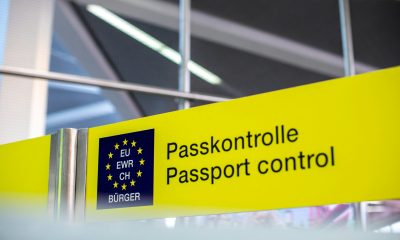Brexit
# CityWeek2018: 'Ekivalans se posib sèlman si gen dirèksyon fèmen nan règ ak sipèvizyon' - Dombrovskis

 Vis Prezidan Dombrovskis (Foto) delivered the key note address as part of ‘City Week’ (24 April), an international financial services forum in London. The EU-27 are willing to hold out the hand of friendship to the UK, but will not hesitate to withdraw it if the UK tries to create a competitive advantage through lighter regulation, ekri Catherine Feore.
Vis Prezidan Dombrovskis (Foto) delivered the key note address as part of ‘City Week’ (24 April), an international financial services forum in London. The EU-27 are willing to hold out the hand of friendship to the UK, but will not hesitate to withdraw it if the UK tries to create a competitive advantage through lighter regulation, ekri Catherine Feore.
The issue of greatest interest to the audience will be Brexit. Dombrovskis said that while the EU-27 and UK had reached an agreement on a joint legal text that covers large parts of the future withdrawal agreement, including a transition period until 31 December 2020, important gaps in the agreement remained, including solutions for the Irish border and the governance of the withdrawal agreement. Given the uncertainty surrounding the UK’s position he advised companies and supervisors to prepare for all scenarios.
The Commission has published notices to help the industry identify the foreseeable consequences of losing the financial passport. But he said ultimate responsibility would lie with companies to identify what impact Brexit will make on their business models.
The EU is closely monitoring markets to avoid major disruption on the day of Brexit. The EU said that current discussions confirm that companies can mitigate risks by re-papering contracts and adapting operational models, this is something Dombrovskis will discuss later today (24 April) with the UK’s Chancellor of the Exchequer Philip Hammond and Governor of the Bank of England Mark Carney.
Last month, the EU-27 set out their negotiation guidelines for an overall understanding of the framework for the future relationship. Up until now, the UK and the other EU Member States have managed risks jointly by setting common rules. And the European Court of Justice has guaranteed that they are enforced against operators from all EU countries. As a result, countries are willing to accept that operators from across the EU export financial services – but also risks – into their territory, without supervising those operators themselves.
With Brexit, the UK will move away from this system. As a consequence, each side will have to set and implement its own rules to protect investors and ensure financial stability. Dombrovskis quoted Chancellor Hammond, saying: "neither side can be a simple rule taker".
Dombrovskis said that the EU has a long history of relying on the regulation and supervision of third countries, provided they achieve the same results as the EU. As of today, we have over 200 equivalence decisions benefiting more than 30 non-EU jurisdictions. No one else has a more open, comprehensive and structured framework of regulatory reliance on third countries. The vice president gave the example of equivalence decisions granted under EMIR, the EU's framework for derivatives clearing. He highlighted that the EU had extended equivalence to central counterparties in 15 non-EU jurisdictions. The EU-27 will want to build and improve equivalence when discussing the future relationship with the UK.
The EU also said that there are some clear limits to equivalence. First, equivalence decisions are and will remain unilateral and discretionary EU acts. Even in trade agreements, governments do not give up power over their core responsibility to protect financial stability. Secondly, equivalence rules do not cover all parts of the financial sector. And third, equivalence is only possible if there is close convergence of rules and supervision.
If the EU and a third country should happen to go different ways, the conditions for equivalence would fall. This means that equivalence may be changed or withdrawn. To make this less likely to occur, supervisors have to work together. Dombrovskis added that the closer the EU’s relationship is with third countries, the more intensive and regular the dialogues with them: "To sum up: equivalence is not perfect, neither for firms nor for supervisors. But we should not let perfect be the enemy of good. Equivalence has proven to be a pragmatic solution that works in many different circumstances, and it can work for the UK after Brexit as well."
Pataje atik sa a:
-

 Iran4 jou de sa
Iran4 jou de saPoukisa apèl palman Inyon Ewopeyen an pou fè lis IRGC kòm yon òganizasyon laterè poko adrese?
-

 Kyrgyzstan5 jou de sa
Kyrgyzstan5 jou de saEnpak Migrasyon Mass Ris sou tansyon etnik nan Kyrgyzstan
-

 Imigrasyon5 jou de sa
Imigrasyon5 jou de saKi sa ki depans pou kenbe eta manm yo soti nan zòn san fwontyè Inyon Ewopeyen an
-

 Brexit4 jou de sa
Brexit4 jou de saYon nouvo pon pou jèn Ewopeyen yo sou tou de bò Chèn nan



























